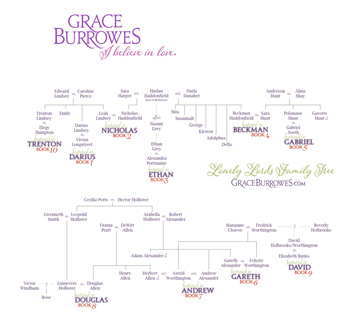Beckman
Lord of Sins
Book 4 in the Lonely Lords series
Beckman Haddonfield has always solved his problems by moving on. When he’s given the job of restoring a family property, he finds in Sara Hunt the one woman who makes him want to put down roots.
As housekeeper on a neglected estate, Sara has finally found a quiet place to raise her daughter and heal from a tumultuous past. She has good reasons for ignoring Beckman’s overtures, but wants to trust him when he says that this time, he’s not going anywhere without her. But will he still say that when Sara’s past catches up with her?
Bonus Materials →
Enjoy An Excerpt







“He insisted on seeing you off.”
Beckman Haddonfield heard his sister Nita clearly, though she’d whispered. The Earl of Bellefonte, glowering at his grown children from the foot of Belle Maison’s front steps likely heard her too.
“Your lordship.” Beck stepped away from his gelding and sketched a bow to his father. Even at this early hour, the earl was attired in morning dress that hung loosely on his stooped frame. His valet and the underbutler were flanking him, each holding a boney arm and trying to look as if they weren’t touching their employer.
“Leave us.” His lordship didn’t look at his servants as he gave that command. “You too, Nita. I won’t perish from the cold, though it might be a welcome relief all around if I did.”
Nita’s blue eyes turned mutinous, though she gathered her shawl more tightly around herself and ascended to the wide front porch.
The earl watched her go then turned to regard his son.
He stabbed his cane in the general direction of the mounting block where Beck’s horse waited. “Get me to the damned mounting block before I fall over.”
Beck took his father’s arm and assisted him to shuffle along until the earl was propped against the top step of the ladies’ mounting block.
His lordship rested both gnarled hands on the top of his cane. “No dignity left whatsoever. Soon I won’t be able to wipe my own arse.”
The truth of this brought a lump to Beck’s throat. “One shudders to consider the fuss you’ll make then. If you’re about to tell me how to find Three Springs, save your breath. I have directions.”
“I’m about to tell you I love you,” the earl groused. “Though such maudlin tripe hardly makes a difference.”
Beck went still, hearing a death knell in his father’s blessing. “One has suspected this is the case,” Beck said slowly. “Ones hopes the suspicions have been mutual.”
The earl’s slight grin appeared. “Couldn’t have danced around a tender sentiment better myself. You really should have been my heir.”
“Stop disrespecting my brother,” Beck retorted, but inside, oh, inside, he was feeling as decrepit and tired as the earl looked. His father loved him, something he had known without realizing it, but his father had also said the words aloud. More than the earl’s frail appearance, this indicated the man was indeed making his final arrangements.
“I’ve said my piece, now get you off to Three Springs and put the place to rights. I’ve every confidence the solicitors have let it go to wrack and ruin.” The earl made as if to rise, something Beck suspected he couldn’t accomplish on his own. Beck drew him up, but not just to his feet. With Nita trying not to cry on the porch, the underbutler blinking furiously, and the footman staring resolutely down the drive, Beck gently hugged his father.
“Papa.” He barely whispered his words past his father’s shoulder. “I don’t want to leave you.”
He had never wanted to be sent away, but each time, he’d known his banishments were earned. This time, try as he might, the only fault he could find with himself was that he loved his father.
The earl said nothing for a moment then patted his son’s back. “You’ll be fine, Beckman. I’ve always been proud of you, you know.”
“Proud of me?” Beck stepped back, depositing his father gently on the mounting block. “I’m nothing more than a frivolous younger son, and that is the plain truth.”
A flattering version of the plain truth, too.
“Bah. You should have gone to London with Nicholas and selected yourself another bride, though I suppose you’ve been trailing him long enough to be ready for a change in scenery.”
He’s sending me away, Beck thought, his self-discipline barely equal to the task of maintaining his composure. He’s sending me away, and we’re discussing my possible marriage to some twit hungering for Nick’s title.
“When Nick is in the room, the ladies do not see me.”
The earl thumped his cane weakly. “Balderdash! Nick is a good time. You are a good man.”
“Nick is a good man,” Beck said, a note of steel creeping into his voice.
“He’ll be a better man and a happier man for finding the right countess. It is the besetting sorrow of my dotage that my sons have not provided me with grandchildren to dandle upon my knee.”
His lordship loved a good scrap. Heart breaking, Beck obliged.
“You would not know how to dandle if the regent commanded it of you.”
“That prancing idiot.” The earl snorted. “I am glad I will be dead before the full extent of his silly imitation of a monarch can damage the country further than it has.”
“It’s too cold to be discussing politics in the drive,” Beck said, ready to have this most painful parting over. “Particularly when you’ve had nothing different to say since the man had his father’s kingdom imposed on him several years ago.”
“You’re right. It’s been the same damned nonsense all along. Pavilions and parks, while the working man can’t afford his bread, and the yeoman’s pasture is fenced away from him at the whim and pleasure of the local baron. Pathetic. Absolutely damned pathetic.”
Utterly. “Good-bye, Papa.”
The earl leaned forward again, signaling Beck to get him on his feet. “You will be fine, Beckman. Keep an eye on Nick for me, as you always have, and think again of remarrying. Good wives have their endearing qualities.”
“Yes, Papa.” Beck mustered a smile, hugged his father again, and waved the underbutler and the footmen down the stairs. “God keep you, sir.” He resisted the urge to cling to his father, knowing he’d embarrass them both if he stayed one moment longer.
“I wish to hell the Lord would see fit to take me rather than keep me,” the earl muttered. “Perhaps patience is the last lesson He has reserved for me. Safe journeys, Beckman. You are a son to make a father proud.”
“My thanks.” Beck swung up, nodded to his sister where she stood clutching her handkerchief at the top of the stairs. He touched his crop to his hat brim then nudged his horse into a rocking canter.
He did not look back. It was all he could do to see the road for the chill wind making his eyes water.
![]()
Sara Hunt took a final swallow of weak, unsweetened, tepid tea, looked out at the miserable day, and decided before the last of the light faded, she’d poke through the contents of Mr. Haddonfield’s enormous wagon.
Lady Warne had written instructing the household to make her grandson welcome as he came to “take Three Springs in hand,” but she hadn’t said exactly when he’d arrive. If Sara was to make a proper inventory of the goods sent ahead of their guest, she’d best do it before the mincing Honorable was underfoot making a nuisance of himself.
She grabbed her heavy wool cloak, traded her house mules for a pair of wooden sabots, took up a lantern, and slipped out the back door. On the stoop she paused, listening to the peculiar sibilance of sleet changing to snow as darkness fell. If the sun came out in the morning, they’d have a fairy-tale landscape of sparkling ice and snow, the last of the season, if they were lucky.
The barn bore the comforting scent of horses and hay on a raw day. The four great beasts that had pulled the loaded wagon into the yard the previous day contentedly inhaled great piles of fodder, while the wagon stood in the barn’s high, arching center aisle.
Sara had just hung up the lantern when she realized something wasn’t right. A shuffling sound came from the far side of the wagon where little light penetrated. The sound was too big to be Heifer investigating under the tarps, not big enough to be a horse shifting in its stall.
She shrank into the shadows. Damn and blast if a vagrant hadn’t spotted the laden wagon and decided to follow it to its destination in hopes of some lucrative larceny. The countryside was not heavily settled, and such a load would be easily remarked. Silently, Sara directed her footsteps to the saddle room, sending up a prayer for Polly and Allie—may her sister and daughter remain in the house, or anywhere but this barn.
She chose a long-handled training whip from the saddle room wall, then retraced her steps and heard muttering from the far side of the wagon.
“And what in blazes is this doing here?” A man asked no one in particular. “As if one needs to fiddle while rusticating. Spices, too, so we might not want for fashionable cuisine in the hinterlands.”
A daft vagrant, then. Sara paused in her slow, silent progress around the wagon. Maybe he was harmless, and simply brandishing the whip would suffice to chase him off, but in this weather… She considered putting the whip down.
A man could catch his death in this miserable wet and cold. Times were hard and getting harder, and there were so many veterans of the Corsican’s foolishness still wandering the land, many of them ailing in both body and spirit. Shouldn’t she offer the man a little Christian charity before she attacked him for merely being curious?
An arm clamped around her neck; another snaked around her waist.
“One move,” said a voice directly behind her, “and you will be the first thing planted this spring.”
Without seeing him, Sara knew many things about whoever owned the rumbling baritone voice at her ear.
First, he was broad, strong, and quite, quite tall. The angle of the arm at her throat told her so, as did the heat radiating from the muscular chest to which she’d been snugly anchored.
Second, he was no indigent. The wool around her neck was soft, expensive, and clean, for all it had gotten a soaking. And beneath the stable smells and the aroma of damp wool, sleet, and cold, there was an unmistakable bergamot fragrance to this man. He bore the kind of scent blended from cologne, French soaps, and assiduous personal hygiene no vagrant veteran practiced.
Third, if Sara didn’t diffuse the situation immediately, she could well end up dead. For herself, she had no great objection to that outcome, being in reasonably good standing with her Maker and profoundly weary of life.
But Sara’s death would leave Allie an orphan and Polly without a sister, and to that, Sara had great objection indeed.
“Unhand me, sir. I pose no threat to you.” Her voice quavered only a little. She raised her chin so the hood of her cloak dropped back, revealing her cap, and apparently, her gender.
“My apologies.” The man dropped his arms and stepped back. “I’ll put aside my knife if you’ll drop that horsewhip. Beckman Haddonfield, at your service.”
Sara took a deep breath and held her ground, not at all looking forward to being disappointed. No man’s looks could make good on the promise of that voice. As a musician—a former musician—she was sensitive to beautiful sounds, and this man’s voice was… too much. Too rich, too deep, too smooth, too lovely in the ear. His words sneaked along Sara’s nerves and sank into her bones like a sweet, lilting adagio played on a fine violoncello. That voice had to belong to some low-browed brute, a backhanded gift from a Creator with an occasionally ironic sense of humor.
When she didn’t turn, large hands settled on her shoulders and gently brought her around.
“And you are?” the intruder asked softly as he pried the whip from her fingers.
Sara looked up, and up some more, to gaze upon a face that more than suited the voice. Oh, damn, Polly would want to paint him. The thick blond hair, sculpted lips, and well-proportioned nose would have testified to aristocratic breeding, if the height and stature had not. That nose bordered on arrogant but stayed just this side of noble. The chin was firm too, coming close to stubborn but stopping at determined instead.
“Ma’am?” In the dim light, a slight smile revealed perfect white teeth—of course, it did—two rows of them, that disappeared with a sardonic lift of one blond eyebrow. And heaven help her, she let her gaze stray to his eyes.
Those eyes were a surprise, not what Sara would expect of a lordling off on a lark. They spoke of the weary humor exhibited by those inured to suffering. They had passed from sad to bleak to endlessly patient.
“Sara Hunt.” She bobbed a semblance of a curtsey and wanted to draw her hood back up. “I gather you are Lady Warne’s grandson?”
“Stepgrandson, to be precise,” the man replied, giving Sara the sense he was always precise. “I see my belongings have arrived safely, as have my father’s horses.”
“The wagon arrived yesterday.” God help them, Lady Warne’s stepgrandson bore no resemblance whatsoever to a Town fribble. “Your rooms are ready, and I will inform our cook you’ll need some sustenance.”
A great deal of sustenance, from the size of him. Polly would be thrilled.
“I trust you are not the stable boy?”
Sara took a moment to realize he was teasing her. She had no idea how tease him back, though his smile said he wouldn’t mind such insubordination.
“Mr. North manages the livestock, but he’s in the village today,” Sara said, her words clipped. Big, gorgeous, and possessed of a voice that could promise a lady ruin at fifty paces, he had no business teasing the help.
Mr. Haddonfield glanced around, his smile fading. “Mr. North would be the steward?”
The barn was snug, tidy, and as clean as such a space could be, and while Sara drew breath, nobody would cast aspersion on North’s efforts to keep it so. “Mr. Gabriel North is the land steward, stable master, house steward, arborist, harness maker, horse doctor, ploughboy, blacksmith, whitesmith, drover, and much more. Your grandmother has not taken a direct interest in this estate for some years, sir, and you will find much evidence thereof.”
Mr. Haddonfield’s expression underwent a subtle transformation. The last hint of banter left his eyes, and by the shadowed lantern light, his features took on an air of resignation.
Not even one night on the property, and Three Springs was already taking its toll on the man.
Rather than gawp at his bleak countenance, Sara took the lantern down from its peg. “Come, sir. You have to be tired, and standing about in wet clothing is not well advised. Your rooms are ready, and a hot meal will soon await you.”
“Then I have arrived to heaven.” He hefted some soft leather version of a portmanteau, rummaged under the tarp, and emerged carrying an oilskin bag and—of all the unexpected things—a violin case.
Sara ignored the violin case but paused when they gained the stable yard. Full darkness had fallen, and the sleet had shifted to a thick, pretty snow.
“It was snowing over the South Downs,” Mr. Haddonfield said, “and here I thought April was fast approaching.”
“We get odd weather down here,” Sara replied. The bleakness was now audible in his lovely voice. “The Channel and the Solent and the time of year conspire to make it so. How is your grandmother?”
“Lady Warne continues in great good spirits. She anticipates the Season as if she were making her come out each and every year.”
Sara stopped and regarded Mr. Haddonfield as snowflakes dusted his hair and eyelashes by lantern light. He was a young man—a man in his prime, an earl’s son—and yet he sounded puzzled that anybody should enjoy the social whirl.
Three Springs tended to collect refugees, and perhaps another had found his way here. The thought was dangerous, suggesting Sara might have something in common with this handsome, wandering man who knew enough to get a violin out of the elements.
She pushed open the back door to the kitchen hallway, only to be greeted by Polly and Allie, holding hands, both in cloaks and boots, and blinking at Sara and her escort.
“Mama?” Allie dropped her aunt’s hand. “Who have you got there? He’s quite interesting.”
Allie would want to paint him. Oh, bother. Bother, bother, bother.
“Allemande Hunt,” Sara said, trying for sternness, “you do not address a guest in such a fashion. Make your curtsey to Mr. Haddonfield and apologize for your manners.”
Allie complied, but she continued to stare at Mr. Haddonfield with a combination of girlish fascination and artistic assessment. A polite version of the same expression—minus the girlish fascination—graced Polly’s face.
“Polly Hunt.” Sara’s sister curtsied prettily. “And if you’ve been traveling in this weather, we’d best see to feeding you. I am Cook in this household, so you’ll please excuse me that I might be about my tasks.”
“I can manage on what’s available,” Mr. Haddonfield replied, offering Polly a smile all the more charming for the fatigue it conveyed. “And I’ve brought in some cooking spices. There’s a particular muffin recipe I’m partial to.”
“You make muffins?” Allie exclaimed. “You do, yourself?”
Sara braced herself to hear her daughter receive a much-deserved set down about children being seen and not heard, particularly the children of servants, but Mr. Haddonfield reached out and tapped Allie’s nose with one long, elegant finger.
“I make muffins, but I require the assistance of competent help, and I cannot possibly bother Miss Polly when she has the entire household to cook for. Perhaps I might prevail upon you, for you are obviously a discerning young lady.”
His countenance changed when he addressed the child. His eyes became clearer, and the smile dimmed to lurk around his mouth. He became not more charming, or not more charming in the way an adult woman might understand it, but… benevolent.
“Aunt Polly? Mama?” Allie turned her great green eyes on the adults. “May I? When Mr. Haddonfield bakes his muffins? May I help?”
Polly, as always, deferred to Sara on matters relating to Allie.
“You may,” Sara said, knowing it was the wrong decision. “Tonight our guest is cold, wet, hungry, and likely exhausted. We must allow him his comforts before imposing on him to teach you a muffin recipe.”
Though they had no real comforts to offer him, only the barest necessities, which added a dollop of embarrassment to Sara’s feelings toward him.
“Shall you take a tray?” Polly asked him. “You have to be famished.”
Mr. Haddonfield shrugged broad shoulders. “I can eat with the rest of the household. I don’t relish a solitary meal above stairs. Is supper served in here when Lady Warne is not in residence?”
“We eat in here,” Polly said. “We have two footmen-of-all-work, but they’ve gone into the village with Mr. North and will likely eat at the posting inn with him. The groom left at Yuletide to be with his parents over the winter but will be back when planting begins—we hope.”
“So I’m to have to the company of three lovely ladies at my supper,” Mr. Haddonfield said. “I’d best get presentable then. I assume you keep country hours?”
“We do,” Sara replied, wondering how an earl’s son became presentable for eating with the servants in the kitchen. “By the time you’ve had your bath, Polly will have supper ready. Allie, you can take off your cloak and boots and help Aunt Polly while I show Mr. Haddonfield to his rooms.”
“Yes, Mama.” Allie’s tone was deferential, though her gaze still strayed speculatively to their guest. Sara could see her daughter taking him apart visually then adding his features back together, one pigment and line at a time. Polly was doing likewise, though she had of necessity grown better at hiding her skills.
![]()
Beck fell in behind the housekeeper as she departed the kitchen, his gaze fixing on the twitch of her skirts. He idly labeled it a pity a woman with such a pleasing shape and such glorious red hair—albeit glorious red hair mostly tucked up under a voluminous white cap—should be sequestered here, bailing with a teacup against an ocean tide of neglect.
“Are there writing implements to hand?” he asked as Mrs. Hunt preceded him along a chilly, darkened corridor. She held the carrying candle in one hand and shielded it with the other, there being no lit sconces that Beck could see.
“Of course.” She didn’t slow or turn to face him. “We’ve put you in the master suite, and you’ll find most amenities at your disposal. Three Springs was well appointed when Lady Warne was younger. The house is still in good condition, though the land needs attention.”
A polite way of saying yet again what the earl had put more bluntly: The estate had been neglected.
“I’m here to put the land to rights,” Beck heard himself volunteer. “If that’s possible before my father shuffles off this mortal coil.”
“I did not know the earl was indisposed.” Mrs. Hunt’s bustling progress came to a pause in the gathering gloom of a sitting room. She used the candle to light a branch on the mantel above a cold hearth.
“His lordship is quite frail. My stay here may be very brief indeed.” Though Beck shuddered to consider crossing the Downs again, much less to attend his father’s funeral.
Mrs. Hunt paused in circumnavigation of the room and gazed at him for a moment, but thank ye gods, there was no pity in her eyes. “And if the land cannot be put to rights while you’re here?”
“That is not my decision. Lady Warne can sell the place, of course. She’s isn’t likely to be leaving Town much when my younger sisters are poised for their come outs. This is a charming room.” Beck saw sturdy masculine furnishings, thick Turkish rugs in burgundy and green, and three large windows covered with heavy burgundy drapes.
“Charming, if outdated,” Mrs. Hunt said. “Lady Warne left the house much as she inherited it, and that was some time ago. Your bedroom is in here.” She opened a discreetly paneled door and led Beck into the cold space beyond. “Had I known when to expect you, I would have lit the fire in here. My apologies for the chill.”
Maybe he was hearing irony in her apology where none was intended, and perhaps threatening a woman’s life was not the best way to make a good first impression, and yet, Beck hadn’t known what or whom to expect on the far side of that wagon. He’d been cold, tired, and in unfamiliar surroundings yet again, almost happy to consider some thief might be attempting to steal from him.
Perhaps he’d apologize. Perhaps if she unbent the least little bit he would tell her he hadn’t meant to frighten her, because that’s what all this sniffy condescension was about whether she knew it or not—he was big, strong, male, and he’d frightened her.
The fire caught—it probably wouldn’t dare do otherwise—and Mrs. Hunt continued her speechifying.
“We typically bathe in the laundry rather than carry the water any distance in cold weather.” She used the bellows to fan the flames, her movements casual and practiced, though they called attention to uncommonly elegant hands.
“I’ll be down shortly to see to my ablutions,” Beck said, unbuttoning his coat as he spoke. “And I’ll make short work of this bath, since dinner looms like divine salvation.”
“Until dinner then,” she said, casting one last glance at him before leaving him in the chill and solitude of his comfortable, if old-fashioned, bedroom.
That last glance stayed with him as he rummaged in his luggage for clean clothes and made his way to the laundry. She was a widow, Beck recalled as he lowered his grateful, sore body into steaming water some minutes later. The look she’d shot him when he’d started on his coat buttons had been hard to decipher: fascinated, dismissive, and wistful, all at once.
Wistful was interesting, Beck thought as he started making use of the soap. No doubt the idea of a man preparing for his bath brought back memories of her departed husband. After Devona’s passing, Beck had cast such glances at the wives being happily handed up into carts in the churchyard, at the matrons cheerfully dancing with their spouses at the assemblies.
Beck closed his eyes and shoved the memories away. He’d traveled like a demon, pushing Ulysses to the limit of the gelding’s considerable capability, wanting to get them both out of the damned miserable weather. Sooner begun was sooner done, and his every instinct was telling him there was much to do here at Three Springs.
“Mr. Haddonfield?” A soft voice pierced the haze of sleep that had descended once Beck had finished washing. “Mr. Haddonfield? Sir?” He felt a hand on his shoulder but wished it away when sleep was a heavy, comforting blanket over his awareness.
“You’ll not get supper,” the voice warned him, “and your water will get cold, so you’ll get the ague and perish without dessert.”
Beck’s eyelids lifted, just as that hand pushed a little harder against his shoulder.
“M’wake,” he muttered, realizing the water was considerably cooler. Without thinking, he stood and heard a soft, female sigh as he did. As his brain caught up to his body—his naked, dripping, exhausted body—he realized Mrs. Hunt was studying him.
“Mrs. Hunt?” He reached for his bath sheet, but did so slowly, struck by the peculiar expression on the lady’s face. She wasn’t horrified, and she wasn’t attracted, but she was somehow interested.
“God above.” The housekeeper exhaled. “Surely Polly would take up sculpting could she see you thus.”
What an odd remark for a housekeeper to make about a cook. She offered no further explanation, just turned and left with a single shake of her head.
Chapter Two
“I’ll see you to your room.” Sara made the offer out of civility. Mr. Haddonfield had been gracious over dinner and afterward had patiently explained whist to Allie, even going so far as to partner the child for a few rounds.
That did not mean Sara liked him.
“I should tell you your escort isn’t needed,” Mr. Haddonfield said. “However, because the house is unlit and I’m dead on my feet, it probably is very necessary.” He winged his arm at her as he spoke, which surprised Sara into outright staring at him, then she gingerly placed her fingers on his sleeve.
Excellent manners were no reason to like a man either—Reynard had had excellent manners, when it suited him.
“What time would you like us to bring you your tea in the morning?” she asked as they traveled the cold, dark hallways and stairs.
“That won’t be necessary. I can find my way to the kitchen the same as the rest of the household no doubt does. I’m a seasoned traveler, and I know how to make shift.”
“We do break our fast in the kitchen, but Polly, Allie, and I have an apartment right off the kitchen, and it’s warm and close to the larder.”
“And where does the estimable Mr. North lay his weary head?”
“Gabriel has a room in the south wing,” she said, though it was none of the gracious, considerate, polite Mr. Haddonfield’s business, and if he was going to suggest that any impropriety at all—
“Good. I would not want ladies to be without protection in the dark of night this far from any town or village. This is my room?”
Maybe she did like him, just a penny’s worth.
“Next door down.” Sara reached forward to open his door then jumped aside, a shriek escaping her as a black-and-white cannonball of fur rocketed past her skirts. In that single instant, several things happened at once.
Heifer yowled his indignation as he shot down the corridor with uncharacteristic speed.
Sara’s candle tipped off its holder when she jumped out of the cat’s path.
She tried to grab the candle as it fell, only to yelp in pain and lose her balance without catching the candle.
The candle winked out as it rolled over her knuckles and hit the floor, leaving a stygian darkness in the hallway.
“Steady.” Mr. Haddonfield’s arms caught her when she would have overbalanced, but Sara’s momentum was such that she pitched into his chest and would have fallen to her hands and knees had he not kept a firm grip on her upper arms. “Take a moment,” he urged, his voice a rumble in the inky darkness.
Up close, he smelled as good as he had in the stables, only more so for having soaked, washed his hair, and shaved. Sara wanted to die of mortification, but in the complete darkness, her balance was hard to regain, so she savored the simple, long-forgotten pleasure of being held by a man.
“I’m all right,” she insisted, except the words came out shaky and unconvincing, even to her own ears.
“Take small breaths.” His thumbs moved against her shoulders in slow circles. “You’ve had a fright. Give yourself a minute.”
She should pull away, Sara knew that, but he wasn’t taking advantage; he was being everything that was gentlemanly, almost brotherly, and she simply lacked the strength of will to stand on her own two feet.
“That’s better. Did you get burned?” He reached around and opened the door to his sitting room, letting a dim light leak into the hallway. “Let’s have a look, shall we?” His arm slipped around Sara’s shoulders as he shepherded her into the sitting room. Maudie, the maid-of-all-work, had left candles lit on the sideboard, and from the bedroom, more weak light came through the door. His rooms weren’t exactly warm, but neither did they bear the bone-chilling cold of the unheated corridor.
“There’s better light in here.” He escorted her to the bedroom, as if waltzing along with housekeepers was a common pastime for him. “I thought the candle might have struck your hand.”
“Not the candle, the wax. It’s nothing, really.”
He towed her over to the fire and examined her hand, using his thumbnail to scrape a drop of warm wax off her knuckle.
“At least the wax,” he said, pulling out his handkerchief. He crossed the room and dipped the linen in a pitcher of drinking water on his night table. “This might take a little of the sting out.”
He wrapped a startlingly cold cloth around Sara’s hand, and it did indeed take the sting out.
“Sit you down.” He pulled out the chair from his escritoire then leaned a hip on the desk, causing the wood to groan, but letting him keep hold of Sara’s hand as she took the chair. “It will likely blister, as red as it is. Have you any aloe?”
“Aloe?” Sara looked at his hand, wrapped around hers. When was the last time she’d held hands with anybody save her daughter or her sister?
“It’s a medicinal plant,” he said, his grip firm and impersonal. “I spent a summer in Virginia a few years ago, right after the hostilities with the Americans concluded, and they’ve a number of plants we don’t find here. I sent as many as I could back to my father for study and propagation.”
“What were you doing in Virginia?” Sara asked out of sheer desperation. The continued grip of his hand around hers was making her insides unsettled, and while she might like him a very little bit, she did not like being unsettled. She’d seen this man in all his naked, Greek-god glory, and now he was holding her hand in dimly lit private quarters.
Though Mr. Haddonfield himself seemed oblivious to every one of those facts.
“My stated task was to assess the viability of investing in tobacco on behalf of my father’s earldom.” He let go of her hand, unwrapped it, peered at it, frowned, and soaked the cloth in cold water again. “I really ought to get you some ointment for this.”
Tending to minor hurts was the housekeeper’s province—her exclusive province. “You really ought not. Is your father raising tobacco now?”
“He is not.” He let her scold go unremarked as he wrapped her hand once again “Tobacco is profitable. It becomes a habit, and those who indulge in it are loyal to their habit, but it’s hard on the land.”
“Is that why the plantations are so large? Because they have to fallow a lot of acreage?”
“Everything in America is large. We think Cornwall is far from civilization, but consider that the distance from Penzance to London—not quite three hundred miles—might be little over a tenth the distance from Atlantic to Pacific coasts, and the Americans intend to lay claim to it all.”
“One tenth? That is incomprehensible.”
“Not to them. It takes half-savage people to deal with so much wilderness, and they will deal with it, inevitably.”
“But you decided not to invest there. Why not?”
“The government isn’t stable, for one thing.” He let go of her hand to soak the handkerchief yet again. “Americans are terminally wary of kings and despots, elected or otherwise, and so they are miserly with their own government, haggling over every tax and tithe, clutching every little power tightly away from their own leaders. Then too, British enterprises are not regarded fondly in the current American climate, and finally, there is the issue of slavery.”
That he would discuss his foreign travels with her was oddly flattering. Maybe she liked him two pennies’ worth. “So no tobacco farming.”
“No tobacco, but I did bring back a number of medicinal plants, some trees, and a few wildflowers to see if they might be grown profitably here.”
“Enterprising of you,” Sara murmured, watching as he unwrapped her hand again.
“It doesn’t look as angry,” he decided. “I’d still feel better if you put something on it.”
Sara took back her hand. “Then I will, when I get to the kitchen. I see Maudie turned down your sheets. The warmer for your sheets is by the hearth, and your wash water is in that ewer.”
He smiled at her, making it even more imperative that Sara get herself down to the kitchen. “And my eyes grow heavier by the second. Good night, Mrs. Hunt, and my thanks for a pleasant welcome to Three Springs.”
“Good night, Mr. Haddonfield, sleep well.”
![]()
Beckman watched the formidable Mrs. Hunt take her leave, watched the graceful way she reached up to appropriate the candle on his mantel. Did she realize she’d lost her cap in the scuffle with the cat?
Her hair was a glorious, vibrant red, though she’d caught it back in a severe bun. The sight of that hair had evoked a sense of déjà vu, the peculiar and unfounded certainty that he’d seen Sara Hunt somewhere else, her hair uncovered and the grace of her hands in evidence.
Which made no sense. She put him in mind of nothing so much as home, bearing about her person the scents of lavender, lemon oil, laundry starch, and other domestic fragrances. Then too, she had hands that were both feminine and competent, not the hands of a debutante but the hands of a grown woman.
His hands had developed an itch to take down that hair and stroke it free and loose down her back. He recognized it as a remnant of the sailor’s reaction to making port after a long, hard voyage, hardly an apt analogy for a little jaunt over the Downs. If he were lusting after a skittish, widowed—albeit pretty and curvaceous—housekeeper, then deprivation and fatigue were making him as indiscriminately randy as his older brother, Nicholas.
![]()
“That was the last of the wine.” Sara let her head rest against the back of the armchair nearest the fire in her tiny sitting room. To call the space where she, Allie, and Polly dwelled an apartment was generous. They had three very small rooms and a sleeping alcove for Allie, though they’d shared far worse on the Continent and been grateful for it.
“She’s asleep,” Polly reported, peeking behind the curtain that provided Allie’s bed a bit of privacy. “I’m surprised you were able to save a bottle so long—it was from Lady Warne’s basket at Christmas, wasn’t it?”
“It was, so unless we’re willing to raid the strong spirits, we’re officially an abstaining household hereafter. The occasional chocolate mousse will do much to console us, though. Whatever possessed you?”
“Winter megrims.” Polly took the other rocking chair, settling in with a sigh that was too weighty for such a young woman.
Part of that sigh, Sara well knew, was because the strain of megrim plaguing Polly had to do with Mr. Gabriel North, who would come home very late to find his favorite treat awaiting him.
Polly set the chair to rocking with a slow, rhythmic creak on the pitch of about… high G. “We need some sweetness in this life, you know? How straitened are we?”
Sara gave the same answer she’d been giving for months. “Desperately, though with the first of the month, we’ll have another quarter’s funds, and that’s just next week.”
“If Lady Warne remembers. Why don’t you tell Mr. Haddonfield there is no money and there hasn’t been enough for the entire time we’ve worked here?”
That Polly assumed Sara would decide what to say to whom rankled, but they knew no other way to go on.
“Lady Warne is elderly. One doesn’t want to offend her, and in all likelihood, she’s grown a bit forgetful. I will impart to Mr. Haddonfield what information is necessary, Polly, but not before it’s necessary. He’s a man, son of an earl, wealthy, and if we just humor him long enough, he’ll likely go whistling on his way as soon as the Season starts up in earnest.”
This was sound reasoning, except it had little basis so far in fact or observation.
“He’d better do more than just make work for us,” Polly threatened darkly. “The household finances are tight, but I think the situation with the estate proper has grown unsalvageable, Sara. Gabriel won’t say, but how does he expect to manage planting with only one team, and the one too old to truly do much?”
“That is Gabriel’s puzzle to solve, and he hasn’t failed Three Springs yet. We each tend to our own concerns, and we do that best on a good night’s sleep.”
Unfortunately for Sara, a good night’s sleep was a necessity she frequently did without. Usually, it was the finances keeping her awake as she figured out ways to squeeze a spare farthing out of each penny or debated how to be more direct with Lady Warne.
Though lately, Sara’s dreams were haunted by the future, by the prospect of more years, more decades even, sneezed away beneath ugly caps in a dusty old house. On the worst nights, she fretted that Tremaine St. Michael would find them, and she’d be denied even those dusty decades and the peace to be had as they drifted by.
![]()
“Sara said there were matters you wanted to discuss with me, and after dinner I have every intention of seeking my bed posthaste.” Gabriel North closed the laundry room door behind him, and yet a cold draft managed to eddy through the room as Beck stood wrapped in towel beside the tub.
“I said that.” Beck frowned, trying to recall what he’d been going on about. The day had been long, cold, and depressing, much of it spent in North’s dark, growling, grousing, but never quite complaining company.
Every roof on every shed, barn, and outbuilding wanted repair. Every ditch and drain needed to be cleaned and unclogged. Every acre was in want of marling; every fence was sagging. The stone walls were nearly frost-heaved into mere piles of rock; the hedges were grown so high they didn’t merely enclose the fields, they obscured them from view entirely.
The place was teetering on the edge of ruin, if not sliding down into the abyss. Beckman did not allow any metaphors to spring from that observation whatsoever.
North tossed him a bath sheet which was threadbare and scratchy but clean. “I’m listening.”
“I wanted to discuss with you the possibility that we can render the twins productive members of the household. Either that”—Beck turned the towel on his damp hair—”or they’re available for employment more suited to their temperaments.”
“You want to cut them loose?” North drained the bathing tub then fastened it back in place. He was nearly as tall as Beck and dark where Beck was fair, but there was something about the look of Mr. Gabriel North that stirred Beck’s memory. His features were harsh the way a man of the land came to look harsh—sun-browned, wind-scoured, crinkled at the corners, tried by biblical plagues and endless fatigue of the body and spirit.
And yet, women would find him attractive. As many foreign lands as Beck had traveled, women in all of them would have found Gabriel North attractive.
“I want to get Timothy and Tobias’s lazy feet out from under Miss Polly and Mrs. Hunt’s table,” Beck said, shrugging into a shirt. “They take more than they give, by all accounts. If you see it otherwise, I’m willing to listen.”
“They eat like a plague of locusts,” North replied, swirling a large, blunt finger in the water in the warming tub. “And while they are not openly insolent with me, I seldom ask them for the time of day. They regard themselves as house servants and resent mightily that there’s no butler, no male hierarchy placing them above the womenfolk because I refuse to trespass on what would be a house steward’s domain. Sara occasionally inspires them to attempt some task, but they are adept at sabotage and have not enough honor to see that the women deserve their help.”
“They’re gone,” Beck said, yanking his breeches up. “If they can’t see how hard the women work, much less how hard you work, then they’re blind as well as stupid. I can offer them to Lady Warne or just set them loose. God above…” He fell silent as North started calmly shedding clothes.
“I am not so pretty as some,” North said as he tilted the warming tub to fill the bathing tub. “But then, I’ve no need to be.”
“Was that a saber wound?” Beck asked, knowing curiosity was ill-mannered, but God’s toes, North was lucky to be alive. The scar ran from his shoulder blade, across his back, right down to the curve of the opposite hip, thick, red, and ugly.
Few women would find that attractive—if any.
North sighed as he sank into the hot water. “A dirty saber wound, and tomorrow night, I go first and bedamned to your papa’s title.”
“You served King and Country?” Beck guessed, because sabers didn’t commonly find themselves slashing at the backs of English land stewards.
“I did not. I’m going to have to appropriate your nancy damned soap, unless you’re willing to retrieve mine from above stairs while I soak.”
“And my dinner gets cold? Not bloody likely. Here.” Beck proved himself the better man for all time and in all ways by not skipping the soap into the tub, but rather, by handing it to the occupant. “You’re dodging my admittedly rude question.”
“My younger brother served,” North said, his focus seemingly on washing one large male foot. “He was wounded. I went to fetch him home from the field hospital where he was not recovering to my father’s satisfaction. As we made our way back to Portugal, some renegade Frenchmen set upon us, though we were both civilians at the time. The French were convinced they’d found officers out of uniform and were anticipating a fine time extracting information from us. My back was slightly the worse for having to differ with them.”
“Oh, slightly,” Beck allowed, wincing inwardly. A wound like that had to have pained him, had to have hurt like hell when he was tired, overworked, sweating like a beast… “You’ll need the shampoo, too, if you’re truly to make an impression.”
“Needs must.” North accepted the tin very civilly handed to him then studied the label at some length. “I’ll need clean clothes too, damn it all. I came haring in here to heed your summons and anticipated I’d have to wait for my bath.”
“My clothes will fit your scrawny frame,” Beck said. “You needn’t be so miserly with the shampoo, for God’s sake. I can get more.”
“Millefleurs was ever a favorite scent of mine. Hildegard will find me irresistible.” North added to the little dab of fragrance in his palm and gave his hair a good scrubbing. Beck was waiting with the rinse water when North came up clean.
“You learned this before you got sent down from valet school,” North suggested as he heaved to his feet.
“I learned this in a hundred different inns and hostelries. Cleanliness is a universal concept, often honored more in the breech.” Beck dumped the water over North’s head before he could reply. He’d been tempted to make the water chillingly cold, but as tired and sore as he was, he could only imagine North would have found some diabolical way to get even. “Your towel, such as it is.”
“It’s clean.” North took the proffered towel. “And so, thank God, am I—even if I smell like an expensive whore.”
“And you would be familiar with this scent?”
North met Beck’s gaze then ducked his face back into the towel, and Beck had the satisfaction of knowing a shrewd and private man had just slipped. He’d slipped only a little, not enough to embarrass either of them, but he’d slipped.
“I’ll take those clothes now.” North hung the towel over a drying rack. “Unless you’d prefer I terrorize the ladies as I am?”
“That scar doesn’t disfigure you.” Beck assembled a stack of clothing and passed it to North. “You earned it, and it’s a symbol of courage and bravery under duress. Nobody—no woman—who cared for you would see it as anything else.”
“If you say so.” North’s tone was supremely bored. “Nice material, Haddonfield.”
“Your clothing is just as well made,” Beck said. “Your boots are Hoby, if quite worn. Your waistcoat is Bond Street, perhaps Weston.”
“Your point?” North wasn’t quite as tall as Beck, but he packed even more muscle, and the clothes fit well.
“I don’t judge a man for wanting some privacy,” Beck said, “but if you’re here under false pretenses, I won’t put up with a threat to my grandmother’s household either.”
Which might be a threat to the Hunt womenfolk, come to that.
“I’m no threat to anyone.” North’s expression was so bleak Beck had to look away.
“That makes two of us, then. Shall we go perfume the kitchen with our tidy selves?”
“Lay on, MacDuff.” North gestured grandly with one arm, and Beck was struck by just how attractive a clean, well-turned-out Gabriel North appeared.
And how aggravatingly familiar… as he accurately quoted Shakespeare and filled out Beck’s finery to good advantage.
Dinner was another surprisingly delicious meal, served in generous portions but without wine. Beck debated offering a bottle from the stores he’d sent down, but because North had helped him unload the wine crates and didn’t remark it, he held his silence.
Dessert was flan, Polly having gotten her hands on both the oranges and the honey Beck had brought from Kent. Allie in particular made short work of her dessert, but Beck came in a close second.
“I have a request of you ladies,” Beck said when everybody’s bowl was empty. “I want to ask you to make a list of household necessities, things that are getting old, worn, or in low supply. I noticed the bath towels are nearly rags, for example, and the runner in the back hallway is nigh coming unbraided. The wagon is empty now, and the team is here. There’s time before planting to make several trips to Portsmouth or even Brighton.”
“That’s very generous of you,” Mrs. Hunt said, meeting Polly’s guarded gaze, “but we’re managing adequately.”
“Lady Warne is a marchioness,” Beck replied, and why had he anticipated having to coax this from them, despite the condition of the estate? “Her lineage is old, much respected, and deserving of a certain dignity. Three Springs falls short of that dignity, through no fault of present company, and I am charged with addressing the oversight. I’d like to see it done before I am recalled to the family seat, which summons might come at any time.”
“Make your list, ladies,” North said as he rose. “You won’t get a better offer, and the poor man thinks a few towels and rugs will restore his grandmama’s kingdom.”
Beck kept his seat. “You as well, North. I realize the situation with the land is growing dire, so prioritize accordingly.”
North sat back down and scowled mightily.
“The first priority would be sending those four mastodons that hauled your treasures here back where they came from. They eat everything in sight, and the new grass is weeks away.”
The wagon had been heavily loaded and pulled not by coaching horses but by the largest draft animals Belle Maison could spare.
“You’re that short of hay?”
“I’ll show you tomorrow what we have on hand,” North said, scrubbing a hand over his face. “It’s enough for our stock, if spring makes a timely appearance, but not much more. I sold off what we didn’t absolutely need, because last year’s yield was surprisingly good, given the generally miserable yields elsewhere.”
“The past few seasons have been odd,” Beck said. “I’ve made my requests, and if you’ll all think on it, that’s enough for the present.”
“We’ll think on it.” Polly rose and caught her sister’s eye. To Beck, the message was clear: Not now, Sister; we’ll talk later. “Allie, I assume you’ll want to scrape out the pan I baked the dessert in before we set it to soaking?”
Allie kept her seat, bouncing around on it in anticipation. “May I, Mama?”
“You may, and thank you for not bolting off as if the table caught fire. Did you put Mr. Haddonfield’s clothes on his sofa?”
Allie looked puzzled. “You didn’t ask me to.”
Mrs. Hunt smiled at her daughter. “My apologies. I meant to, but then the scent of Polly’s flan tickled my nose, and I must have forgotten. Mr. Haddonfield, if you want to gather your laundry, I’ll light you up.”
“I’ll meet you in the laundry,” Beck said. “Miss Polly, my compliments on another splendid meal. If you’ll write the recipe down for that flan, I’ll send it along to my father’s cook. The orange zest is a magnificent touch.”
“Of course.” Polly looked pleased but wouldn’t meet his gaze—though North was looking a bit disconcerted—so Beck contented himself with tweaking Allie’s braid and bidding the child good night.
Beck cocked a finger-pistol at North. “Scrambled eggs at dawn, Mr. North. Last man out of bed has to clean up and take the scraps to the fair Hildy.”
“I’ll lie awake all night rather than suffer such a fate.” North bowed with disconcerting elegance and disappeared up the steps.
Beck fetched an impressive pile of laundry, more than he’d realized a week of living could create. He’d arranged the load in a wicker basket when Mrs. Hunt joined him, a single candle in her hand.
Beck picked up the basket, lest she attempt to carry both the laundry and her candle. While they were wending their way through the darkened corridors of the house, Beck felt the chill seeping into his bones.
“I cannot recall a time when I was so desperately looking forward to my bed,” he mused, mostly because his escort did not offer any conversation. “Whatever I expected of this place, it wasn’t immediate exhaustion.”
“You learn to pace yourself. It wasn’t what I expected here either.”
“How did you come to be here?” Beck asked, keeping his tone casual.
“My husband died while we were in Italy,” she said, slowing to navigate a set of stairs. “Lady Warne was touring and had called upon us socially. She heard of Reynard’s situation and offered us passage back here and employment for me. The packet landed in Brighton, and we’ve been here ever since.”
This recitation struck Beck as a radically abbreviated telling of a more complicated tale. “And that was when?”
“A few years ago. A month after we got here, the old cook quit without notice, so Polly took over.”
“She does very well with it,” Beck said as they approached his room. Since his hands were full, Mrs. Hunt opened the door and preceded him into his sitting room. Once again, somebody had lit his fire, set his wash water by the hearth, and refilled the pitcher of drinking water. The room smelled good too, as if someone had freshened the lavender sachets hanging from the curtain sashes.
The effect was pleasant and welcoming, and yet Beck wasn’t entirely comfortable with the notion that Mrs. Hunt herself had troubled over his comforts.
“I’ve added to your burden,” he said, glancing around the room. “Just by being here, I make more work.”
“But you lightened Gabriel’s load.” She lit the candles on his mantel and moved off to light some in his bedroom. “I’m surprised he allows it.”
“He’s an independent sort. I also think there’s a bit of putting me through my paces going on.”
“Maybe.” She stood in the door between the two rooms and offered him a half smile. “Do you blame him?”
“Of course not.” Beck put down his basket of laundry. “I meant what I said, Mrs. Hunt, about making a list.”
Her smile became a quarter smile, then an eighth. “Of course you did. The question is, when you’ve replaced the towels and rugs, as Gabriel terms them, then what?”
“Then you have a livable property worthy of the Marchioness of Warne.” Beck was tired and not up to deciphering females’ moods.
“Or you have a saleable property, don’t you?”
This again? “You think I’d turn out three females and a man who has worked himself to the bone simply to add to my grandmother’s coffers?”
Her chin came up in a very unservile manner. “We’re hired help, and you’re the son of an earl. We live in an age of clearances and enclosures, Mr. Haddonfield. The working man can riot all he wants over the price of bread, but the price of bread doesn’t change. You’re perfectly within your rights to work us nigh to death and then sell the place for a song.”
Beck advanced on her, fatigue letting his temper strain its leash. “Firstly, any decision to sell would be made by my grandmother, whose generosity of spirit has been proven by her dealings with you. Secondly, my task is to put the place to rights, not sell it. It’s no more for sale now than it was the day you got here, Mrs. Hunt. Thirdly, I am a gentleman and would not leave you and yours to starve when you’ve served the family loyally under trying circumstances.”
“I know better than to depend on any man’s word,” Mrs. Hunt said, her voice low and fierce as she glared up at him. “You mean what you say, now, Mr. Haddonfield. I’ll grant you that much, but if your grandmother should die or the earl redirect your task, you can’t stop the place from being sold.”
Beck’s brows came down in a frown, and he realized with a start he was not dealing with an arrogant exponent of the working class, but rather, a very tired, frightened mother and widow.
His second realization was that Mrs. Hunt employed a stage trick to make her presence more imposing: She remained always in motion. He’d observed her throughout the day, skirts always swishing madly. She dusted, she swept, she scrubbed; she beat carpets, boiled laundry, and bustled about, a rampage of cleaning on two feet. Standing this close to her, Beck saw she was in truth a slender woman of not much more than average height—and a tired slender woman at that.
“I cannot stop my relatives from dying or selling your home,” Beck said, his tone much less belligerent, “but I can assure you they are honorable people, and when I convey to them the conditions under which you’ve labored, they will understand their debt to you, and to Polly and North. Mrs. Hunt—Sara—are you all right?”
![]()
Mr. Haddonfield moved closer, close enough that Sara could catch a whiff of bergamot, an incongruous counterpoint to the roaring in her ears.
“I just need to sit,” she managed. She felt the candle being taken from her grasp and then, in the next instant, felt herself scooped up and deposited on the bed, the scent of lavender bed sachets filling her nose.
“Head down.” Mr. Haddonfield put a hand on her nape and gently forced her to curl her nose down to her knees. “You stay like that, and I’ll fetch you some water.”
She complied, not raising her head, the better to hide the ferocious blush suffusing her features. Her cap went tumbling to the floor, and she didn’t try to restore it.
Mr. Haddonfield lowered himself beside her and let her ease back to a sitting position. “Better?”
“Better,” Sara said. “I’m all right, really, but sometimes…”
“Drink.” He wrapped her hand around a cold glass of water, peering at her with concern. “Your color is off.”
“I’m pale by nature.” Sara sipped the water cautiously.
“You’re flushed now.” His regard turned to a frown. “Are you coming down with something?”
“No,” Sara said, handing him back the glass.
“I see.” And perhaps he did see—possessed as he was of four sisters who each no doubt came down with the selfsame malady Sara suffered every four weeks or so. “I’ve wondered how women cope. Have some more water.”
Sara stole a peek at him. He wasn’t blushing or studying his fingernails or the ceiling, which was oddly heartening. They must be formidable sisters. “There’s always a tot of the poppy when coping is truly a challenge.”
“I’ve seen my sister Kirsten wrapped so tightly around her hot water bottle you’d think it was her firstborn child. Susannah copes by tippling, and Della rages and breaks things, then gets weepy and quiet.”
“I was like that,” Sara said, knowing she shouldn’t have this discussion with him. She’d certainly never had it with Reynard. “When I was younger, that is. I hope I don’t rage and break things now, but the water bottle and the tippling sound appealing.”
“Except you haven’t a water bottle,” he guessed. “And the only thing to tipple is the brandy I see in dusty decanters throughout the house, which might be a bit much.”
“You’re right, though I can put Madeira on my wishing list, can’t I?”
“It’s not a wishing list, it’s a shopping list.” He sounded both amused and exasperated. “You’ll come to Portsmouth with me, because I’ve not shopped there in recent memory.”
“The roads are miserable this time of year,” Sara said, fatigue and the drops of laudanum she’d added to her tea making her eyes heavy. “We’ll be stuck in town overnight, and that costs money.”
And it would probably rain the entire time. Why did certain times of the month make a woman prone to the weeps?
“You should know Lady Warne is very well off, Mrs. Hunt. There’s no excuse for her allowing this place to flounder as it has, except she delegated the land management to my father, and he delegated the task in turn to a pack of jackals posing as his London solicitors.”
Mr. Haddonfield sounded very stern and a little bit far away, though he sat close enough that Sara could see a small J-shaped scar just past his hairline near his temple. She wanted to brush his hair back the better to examine the scar.
Sara refocused her thoughts to pick up the thread of the conversation. “The Three Springs house finances are still managed by Lady Warne herself. She sends down a quarterly allowance for the household, and separate funds for the kitchen. Polly and I receive salaries directly from her quarterly as well.”
“So why are things in such poor condition?” Mr. Haddonfield asked. He reached out and brushed her hair back over her ear. The gesture should have startled Sara right off the bed, when instead it made her want to purr.
Like Heifer, who was probably the happiest member of the household.
“I’ve told Lady Warne the funds aren’t sufficient as baldly as I might. It’s as if she doesn’t get my letters. Her notes are chatty and pleasant and wish us well, but the funding doesn’t change.”
“She’ll read my letters. If I have to have Nicholas read them to her, she’ll read them.” He was very sure of himself. She’d expect no less of him.
“Who is Nicholas?” Sara’s words came out sleepy, not quite slurred, and Mr. Haddonfield made the same gesture again, smoothing her hair back over her ear. She should rebuke him, except there was no disrespect in his touch.
Only an inability to abide disorder—Sara suffered from the same penchant—or perhaps a passing inclination to offer comfort.
“Nicholas is my older brother, the heir to the earldom, whose job while I’m immured here is to marry his prospective countess.”
A little silence ensued, broken only by the crackling of the fire. He caressed her hair a couple of more times, his touch lingering.
“Mrs. Hunt?” Mr. Haddonfield’s hand slid to her shoulder and shook it lightly. “Sara?”
“Hmm?” Her eyes fluttered open, and she focused on him with effort. Too much laudanum and too little sleep. What must he think of her?
“You’re falling asleep. North claims it can be done with the eyes open. I can carry you to your bed.”
“Carry me?” Sara straightened her spine through force of will, but between fatigue, the dragging of the poppy, and the mesmerizing pleasure of Mr. Haddonfield’s hand, it was an enormous effort. “That won’t be necessary.”
His smile was slow and slightly naughty, like a small boy would be naughty, not a grown man. “If I wanted to carry you, you couldn’t stop me.”
“But you are a gentleman, so you will not argue this point with me.”
“Suppose not, though I’ll see you down the stairs, at least.”
“I’m a housekeeper, Mr. Haddonfield.” Sara rose, only to find her hand placed on Haddonfield’s arm and held there by virtue of his fingers over her knuckles. “Your gallantries are wasted on me.”
Though they were sweet, those gallantries. Sara liked them probably about as much as Mr. North liked his chocolate mousse.
“I respectfully disagree.” He took up the candle and escorted her from the room. “If I lose favor with you, I’m out of clean laundry, candles, coal and wood for my fire, clean sheets, and God help me if I should split the seam of my breeches.”
“God help us all, in that case.” Sara gave up trying to hold her weariness at bay and moved at his side through the darkened house. “You really aren’t going to sell the place?”
Beside her, Mr. Haddonfield stopped, a sigh escaping him in the near darkness.
He set the candle down and turned her by the shoulders, while Sara felt her heart speeding up for no good reason.
“You’ve managed as best you can, managed brilliantly, but you’re battle weary, Sara. You keep firing when the enemy has quit the field.” He kept a hand on her shoulder, his thumb sliding across her collarbone in a slow, rhythmic caress.
He made no other move; he didn’t use that seductive baritone on her in the darkened corridor, just circled his thumb over the spot where neck, shoulder, and collarbone came together. A vulnerable, lonely point on a woman’s body.
Her mind did not comprehend what he was offering, but her soul longed for it, and her body leaned closer to his, then closer still. In the cold, dark corridor, she leaned on him, despite her pride, despite common sense, despite all the reasons she couldn’t lean on any man ever again.
His arms came around her, and it felt so good. He’d called her Sara, and that had felt good too.
“I give you my word I will not recommend to my father or to Lady Warne that Three Springs be sold,” he said, his voice sounding near her ear. “The house has good bones, and the resources are available to set it to rights. And even if Lady Warne should die and leave the property to some distant relation, I’ll see you and yours situated. I give you my word on that too, and I’ve the means to do it, easily.”
She lingered in his embrace for a few precious moments, wanting to believe him but knowing only that she hadn’t been held like this for years. It was worse, in a way, to be reminded of what she’d never have.
“Come.” He turned her under his arm and slipped his hand down to her waist. With his free hand, he picked up the candle then escorted her in silence to the foot of the stairs. “Do you believe me, Sara?”
“I believe you mean what you say. I do not believe life often fits itself to our intentions, though.”
“You’re cautious. I can understand caution. To bed with you now, and you are ordered to make a nice long, expensive list for me, agreed?”
“I can manage that.” She managed a smile too, albeit a tired one.
“Take the candle.” He passed it to her, along with a smile that conveyed benevolence and something friendlier. His lips brushed her forehead, feather soft, like a warm breeze in the depth of winter. “Sweet dreams.”
“Likewise.” Sara turned without further word, feeling an equal inclination to touch her fingers to the center of her forehead and cry like a motherless child.
Menses. Damned, interminable, inevitable, toweringly inconvenient menses, and a tot of the poppy. That’s what put her in such a taking. It had to be her menses.
Chapter Three
Allie opened the door to a large, mostly bare room on the third floor. “This is my favorite place to play. I like the light best here, even on rainy days.”
The light was abundant, Beck noted, mostly because what came in the row of uncurtained windows reflected off the gleaming hardwood floor and ricocheted off unadorned walls and a single large mirror.
“You paint.” Beck took in the folded, paint-spattered cloth, the shortened easel collapsed against the wall, and the lingering scents of linseed and turpentine.
“I love to paint. I’m not allowed to paint human subjects, or portraits, but I will when I’m older, Mama said. This is what I finished a few days ago, so now I won’t paint for a while. Mama doesn’t want me to forget how to be a child, whatever that means.”
She gamboled over to him, a small canvas in her hand. Beck took it from her, expecting to have to gush credibly over a crude rendering of some books and flowers.
“God’s toenails.” His carried the painting to the windows the better to goggle at it. George was the art connoisseur of the family, but Beck had been to enough royal exhibitions at various European courts and was enough his mother’s son to have something of an eye.
“This is quite good. I expect Heifer to yawn and stretch right in my hands.” She’d used brushstrokes to somehow render his fur nearly… pettable.
“The light on the mouse isn’t quite right.” Allie leaned over his forearm to peer at her work. “I’m working on secondary light sources, according to Aunt. She’s my teacher. I got Heifer right, because he will hold still and let me study him, but mice aren’t good subjects.”
“You could study a painting of a mouse, or do sketches to work it out.”
Allie looked intrigued. “I’ve never used a painting as a subject. It would have to be a good painting.”
“If you go to the exhibitions in London, there are all manner of art students sketching the masterworks,” Beck said, still fascinated with the little canvas, because clearly, he was in the presence of a budding genius. Allie’s quick mind and inherent creativity weren’t suffering for lack of hide-and-seek. The child was built to focus on things more interesting and sophisticated than which playmate was hidden under the bed.
“You’ve got a whimsical touch, Allie.” Beck tilted the frame. “You’re deadly accurate too. Don’t paint sad things, or you’ll have everybody in tears.”
Allie took the painting from him and frowned at it. “You don’t think I should stick to watercolors?”
“Are you competent with watercolors?” Beck asked, eyeing the room and seeing it made over into a studio.
Allie wrinkled her nose. “I’m competent. Watercolors are tedious, though, and best suited to tedious subjects, like weather and landscapes. For living things, oils are better.”
“But you’re not to paint portraits?”
“I am not.” Allie heaved a martyred sigh. “So I did Heifer, and I rather like it myself. I think I’ll do him again—Mama allowed it wasn’t quite a portrait.”
“You could also do my horse. There are people who make a great deal of money doing portraits of beasts for the very wealthy.”
“I could be rich?” Allie was pleased with this notion.
“Or you could be in a lot of trouble.” Sara’s voice cracked like a whip from the door.
“Hullo, Mama.” Allie’s features arranged themselves into careful neutrality, and Beck felt as if the sun had disappeared behind a maternal thundercloud.
He donned a smile and faced the bad weather. “Good morning, Mrs. Hunt. You look rested.”
She did. Rested and mortally peeved.
“Allemande, your aunt could use help preparing luncheon,” Sara said, her tone softening. “And there’s a bucket of scraps to take out to Hildegard. If you see Mr. North, tell him lunch will be ready soon.”
“Yes, Mama.” Allie scampered off, leaving a ringing silence in her wake.
“She’s quite talented.” Beck picked up the cat’s picture. “Quite talented.”
“She’s quite young,” Sara rejoined, but her tone was weary, despite her well-rested state.
“How are you feeling?” Beck intended the question to be polite but realized he truly wanted to know. She’d been dead on her feet the night before, and by his reckoning, had slept only eight hours. By the time he’d left Paris, he’d been capable of sleeping for days at a stretch.
“Rested.” She took the painting from him and sank down onto a daybed protected by a Holland cover. “Or maybe not rested enough. I feel like my head is wrapped in cotton wool, and I could just sleep until the flowers are up.”
“Laudanum leaves me feeling that way,” Beck said, sitting beside her uninvited. Laudanum had left him within a whisker of permanent oblivion, truth be known.
“I used only a drop. I only ever use a drop.”
“Good for you.” Beck studied her hands while pretending to look at the painting rather than let the conversation wander over the relative merits of laudanum, absinthe, hashish, and other poisons. “She says she’s working on secondary light sources. What are those?”
“Polly could explain it best, but if I tried to paint, say the leg of that chair, I’d have to account for the effect of the sunlight coming directly in the window and for the light reflecting from the mirror behind the chair. One way to study it is to take away the mirror, then put it back, and so forth.”
“But Allie’s approach is more instinctive than that. She’s an artist, not a technician. For a young girl, she’s very, very good.”
“She scares the daylights out of me,” Sara said quietly as she rose and turned her back to him. “Any child is prey to the more powerful people in her life, but a talented child in particular. Allie is isolated here, I know, but I don’t think she’s unhappy. Polly is a good instructor, and there’s more to life than painting as long as Allie is with us. My own mother…”
“Yes?” Beck’s gaze went beyond Sara to the wide windows that opened on a bleak view of the snow-dusted Downs to the north. He had the sense this mother Sara alluded to lived off in that direction.
“She worried, like I’m worrying. Papa too.”
He took a step closer. “Over Polly’s talent? Allie said Polly is her instructor.”
Sara looked momentarily confused. “Yes, they worried over Polly, but over me too, and Gavin.”
“Who is Gavin?” Beck shifted again to stand beside her.
“Was.” Sara glanced over at him, a mere flick of her gaze over his face before she was again inspecting the hills in the distance. “He was our older brother, but he died shortly before I married. Everybody called him Gavin, but his real name was Gavotte.”
“Allemande, Gavotte… Was yours a musical family?”
“We were. My husband said he fell in love with my name.”
Her tone suggested this was not a cheering memory. “Sarabande,” Beck guessed. “It is pretty, and… Polonaise?”
“Sarabande Adagio.” Her lips quirked up, as if a housekeeper ought not to have such a fanciful name. “I was Sara Addy when was I younger.”
“That’s lovelier than Beckman Sylvanus Haddonfield. My mother wanted me to have a name that would stand up to the rigors of being the spare.”
“Are there rigors?” This time, her glance lingered over him. “You don’t seem like a man who’s burdened by his birthright.”
“That’s the second time the topic has come up today.” Beck shifted away from the substantial chill coming off the windows. “North quizzed me on it over breakfast, and his questions set me to thinking.”
“About?”
“What is a land steward doing reading the label of my shampoo tin?” Beck asked slowly.
“Waiting for his turn in the bath?”
“The label is entirely in French, Sara,” Beck said gently. “Florid, silly French. He quotes Shakespeare, and his clothing is made by the finest tailors in London. How much do you know about our Mr. North?”
“Not as much as you’d like to know, apparently,” Sara replied. “I know this. Until he arrived shortly after us, the place was a shambles. Lady Warne hasn’t been here for years and years, and if you think it’s a disgrace now, you should have seen it before Gabriel put his shoulder to the wheel.”
“I don’t dispute that he works very hard.” Beck regretted bringing the subject up at all, but if North hadn’t served in the military, the explanation he’d given for his scar was somewhat suspect. “And a man’s past is his own business, unless it’s going to haunt him and those around him.”
“We’re all haunted by our pasts.” Sara shifted away from the window, as if leaving the topic itself out there on the Downs. “Luncheon approaches, and that seems more worthy of attention at the moment. I trust Gabriel, and I do not feel comfortable discussing him behind his back.”
“Not well done of me,” Beck admitted. “I’m to spend the afternoon with him going over the books. Have you started on your shopping list?”
“I have not,” Sara said, preceding him through the door. “I spent the morning cutting out a dress for Allie. Warm weather finally approaches, and the only bolt of suitable material I have is summer weight.”
“And what about some new dresses for you and Polly?” Beck asked, putting her hand on his forearm. “You are females, and human, and that means a new frock from time to time is in order.”
“We’re managing. One needn’t have an impressive wardrobe to bring Hildy her slops.”
Beside her, Beck remained silent, but he felt frustration stirring. Managing was Sarabande Adagio Hunt’s euphemism for eking out survival on a rotten, neglected estate far from meaningful society. He suspected some fear kept her here, grateful for her bleak, busy existence, but he railed against the compromise she’d made for herself and for her daughter.
Maybe she rusticated here, far from home and family, because she was afraid this was her only alternative to starvation.
Maybe she was still grieving the husband who died in Italy.
Maybe she feared the world’s influence on her talented daughter.
And maybe—claiming to have been married but bearing the same last name as her unwed sister—Sara feared her own secrets might come to light. Beck felt that thought settle in the back of his mind, knowing it wouldn’t let him rest until he’d gotten to the bottom of it.
![]()
“I believe the hallmark of the term ‘footman’ is that those answering to the description be on their feet.” Beck kept his voice down because no Haddonfield over six feet tall ever had to raise his voice to be heard. When he saw he had Timothy and Tobias’s attention, he continued in the same chillingly civil tones.
“I wanted to give you two the benefit of some doubt.” He glanced around the room. “But seeing—and smelling—the state into which you’ve allowed your own quarters to deteriorate, there’s little likelihood you’re just a pair of misguided, empty-headed fellows needing a firm hand to steer you back to the true definition of earning a wage.”
“Now see here, guv.” Tobias, the less odoriferous of the pair, managed to stand at last. “You can’t come a-bustin’ in here, tossing insults around like some… some…” He glanced at his brother, and support arrived on cue.
“Like some nabob new to his riches. Footmen wait on the family, not on the servants, and that’s a natural fact.” Tim didn’t bother to get to his feet to deliver this pearl, but from his position lounging on his cot, he grinned at his brother.
Tobias nodded smugly. “Aye, like a nabob new to his riches.”
“Because I am Lady’s Warne’s family, you ignore my words at your peril,” Beck said. “Firstly, you will wash your persons at the cistern behind the barn. You disgrace Miss Polly’s table in your present condition, not to mention the memory of a mother who no doubt raised you better than this. Secondly, you will present yourselves, in livery, to Mrs. Hunt, and notify her that henceforth, you will be filling all of the wood boxes and coal buckets twice daily. You will trim wicks, refill the oil lamps, dust the entire library weekly, then start on the windows in the library, and continue on until every window on the house is scrubbed inside and out. Lady Warne pays good money to the Crown for the privilege of her windows, the least you can do is allow us to see out of them.”
“You want us to wash?” Tobias looked utterly flummoxed. “In the cistern?”
“You aren’t fit for the laundry. Should you find my direction not to your liking, I’ll be taking the team into Portsmouth soon. You are welcome to collect two week’s wages and seek other employment there, in which case you will need to clean this sty—Hildegard would disdain your chambers in their present condition—or the cost of cleaning it will be deducted from your severance. I’ll tell Mrs. Hunt to expect by you by two of the clock.”
“Severance?”
The word hung in the air as Beck softly closed the door and took a few lungfuls of clean, cold air. They had a parlor stove in their room, and apparently felt no compunction about keeping it stoked with coal. The stench had been amazing, as had Beck’s forbearance.
He couldn’t stand a cheat, and these two had been cheating his grandmother—step-grandmother, true, but an old woman nonetheless—for years. He sincerely hoped they caught their deaths scrubbing in the cistern.
“You look like you want to kill someone,” North remarked conversationally.
Beck stopped on the back porch and took another series of deep breaths.
“How did you not kill them? Even a footman has a certain kind of honor. A damned potboy can know enough to earn his wages.”
North glanced up at the sky assessingly. “In my experience, the nobility have no corner on a lack of personal integrity. Are you ready to see the books?”
“I’m ready to hit something.” Or to find the brandy decanter and become thoroughly familiar with its contents—which would not solve the problem at hand and would plunge Beck into a pit of self-recrimination.
“If you truly want a round of fisticuffs, I’m happy to oblige.” North began to shrug out of his coat. “I’ve always wondered what Gentleman Jackson really accomplished with his young sprigs.”
“North,” Beck’s tone eased, “you needn’t oblige violent urges you didn’t inspire. Besides, I wouldn’t want to earn Miss Polly’s everlasting ire by rearranging the features the Creator gave you.”
North shrugged back into his coat. “As long as I can eat, Miss Polly will be content.”
“I don’t think you give your animal charm and sophisticated manners enough credit. She watches you eat the way I watch some women walk away.”
North glanced at him, his expression unreadable.
“It’s spring,” he said shortly. “You’re away from the pleasures of Town and seeing the sap rise wherever you look. But if I catch you watching Polly walk away with one hint of disrespect on your ugly face, Haddonfield, I will rearrange your features.”
“I’m all atremble.” Beck resisted the urge to probe, though Miss Polly’s sentiments toward Mr. North were apparently returned on some level. “I can only hope the twins are trembling as well.”
“My feelings regarding those two are mixed.” North opened the door to the back hallway. “On the one hand, I hope they stay and become useful. Finding good domestics here in the provinces is nigh impossible. On the other hand, I will never trust them, because they’ve shown they lack honor but can be motivated by fear.”
Beck followed him into the house. “You have a way of boiling things down to essentials that puts me in mind of Lady Warne herself, and perhaps my father.”
“Flattery will get you nowhere,” North tossed over his shoulder. “Shall we make a pot of tea to cheer us on?”
“And snitch a few of the biscuits Miss Polly baked this morning,” Beck said, lifting the lid of a large crockery jar.
“That’s only the decoy cache, you know.” North rinsed out the teapot and refilled it from the kettle on the hob.
“Of course I know.” Beck extracted a large handful of biscuits. “I also know Miss Polly would be insulted did we not raid it. Bring the honey. I refuse to face book work without something sweet in my tea, and do not think of reusing the damned leaves.”
“Oh, the Quality…” North muttered loudly enough for Beck to hear. He loaded their tea tray with cream, honey, and mugs nonetheless.
Beck took the tray from the counter. “What did your expert agrarian assessment of the sky foretell in terms of the weather?”
“The same thing it’s foretold for several weeks now.” North grabbed a tea towel, draped it over Beck’s shoulder, and followed him up the back stairs. “Spring is coming.”
“My grandmother employs genius at every turn,” Beck muttered loudly enough for North to hear.
“I might trip, you know?” North informed nobody in particular, “and bump into somebody else, who might drop our only good teapot.”
“My second-favorite teapot sits ready to serve in the pantry,” Beck tossed over his shoulder as they reached the library. “Please God tell me you lit a damned fire in here.”
“Wood, we have,” North said, holding the door for him. “At least for another year or two, but when we catch up with the deadfall, we’ll be buying coal like everybody else. Let’s use the low table. The desk is too far from the hearth.”
The room was high ceilinged, so the roaring fire in the hearth cast out only so much warmth, but the sofa facing it helped keep what there was from dissipating entirely. Beck set the tea service on the desk and poured them each a cup.
“You keep the books?” he asked, handing North his own cup to doctor.
“I do,” North said, adding both honey and cream, much to Beck’s satisfaction. “I incorporate the household expenses in the general ledger, but Sara has her own set of books, though why she bothers I do not know.”
Beck sipped and decided that with cream and honey, strong black tea was almost a substitute for a stout tot of brandy.
Almost.
“Why shouldn’t she track expenses and income?” Beck asked, moving to the sofa. North stayed by the desk, stirring his tea.
“I’ve met Lady Warne a handful of times,” he said, “so don’t come after me with fists flying when I say I’ve doubted her grasp of reality.”
“My fist is wrapped around a strong, hot cup of tea. Perfectly happy there, too. Why do you question Lady Warne’s sanity?”
“She must think a household runs on good cheer.” North sank onto the sofa near Beck. “She sends along chatty, gossipy little notes, updating the ladies on the latest fashion gaffes made by the strutting dandies and preening peacocks in Mayfair—as if Polly or Sara care a damn for any of that. But she neglects as often as she recalls to send the sums they are to use to sustain life here. I suspect they both use their salaries to augment what is intended to be the household budget.”
“As you use yours?”
“Drink your tea or it will get cold, and we’ll be forced to dust off that decanter, which goes against my grain, as the help mustn’t tipple.”
“You’re the help now? How movingly humble you’ve become, North. So show me these books and then to the brandy.”
He regretted those words. Drinking before dinner was ill advised in the extreme. But he’d been good lately—appallingly good—and he still wanted to hit something and somebody as the enormity of the neglect all around him only became more obvious.
North had all but cheated the devil to keep any crop going on the place, and at a time when what a crop could fetch was precious little, and what it cost to farm was great.
“And it’s not going to get better for some time,” Beck said several hours later. “The general state of things, I mean. The weather for the past few years hasn’t helped, but you can’t cashier out thousands of able-bodied men who fought for damned near two decades, and not see an impact. Then too, there are markets for what England produces, but it hardly pays to try to export with the taxes so high.”
“We still have the free trade on this coast,” North said. “Conditions on the Continent are far worse than what we suffer here, and there’s a market for almost anything you can sneak onto a boat.”
“I will ignore your casual observation.” Beck sat back and let North pour them each a tot of brandy. The drink was good quality, which helped a man sip it, regardless of all temptation to the contrary. “What a bloody mess.”
North enjoyed his brandy in silence, while Beck cogitated and drank.
With North’s dark gaze taking in every movement, Beck set his glass down on a corner of the table not covered with ledgers. “My father’s dying request was that I set the place to rights, because he felt the neglect here was a blot on his honor. I intend to see his wishes carried out.”
“Your father is dying?” North put the question casually, no more weight to it than, “Your horse is a bay?”
Well, hell. In for a penny…
“Bellefonte is at his last prayers.” Beck got the words out by staring at his half-empty glass. “Sent me off so I wouldn’t have to see the final indignities. Sent us all off, except for my sister Nita.”
“And this is why your brother is hunting a bride? You’re the spare, why aren’t you on the prowl with him?”
“Took my turn in that barrel, North.” Had North offered condolences, Beck would have left the room and taken the decanter with him. “Even Papa won’t ask that of me again. Started me on rather an unfortunate road, but Nick’s the better fellow, and he’ll manage. What do you recommend for Three Springs?”
North frowned—North was always frowning, so Beck tried not to ascribe significance to it.
“You ask my prescription for Three Springs,” North said. “It will take more than money, Haddonfield. In the last century, this was a gracious, respected manor, and people were happy to work here. I’ve heard enough in the village to know they take the twins as the measure of the place. The locals won’t throw in with Three Springs if they think you’re just a nine days’ wonder, down from Town to count the lambs then disappear. Somebody has to convey an abiding interest in this place. I nominate you.”
North’s grasp of the situation and logic he applied to it were unassailable.
“Nomination declined. I’ve two younger brothers who could use a property, and four sisters in need of a dowry. Let’s nominate one of them, shall we? Then too, when Nick becomes earl, he can use this as one more excuse to get away from his countess.”
“My condolences to his countess,” North said in equally level tones. “In any case, you can’t just buy Three Springs’s way back to profitability. You have to earn its way back to respectability.”
Beck leaned against the sofa’s lumpy upholstery and silently railed against these simple truths, truths he’d thought applied mostly to people and not pieces of the English countryside. “You are a cruel man, Gabriel North. I like you.”
North blinked then smiled, an expression both sardonic and sweet. “I like you too, Haddonfield. You preserve me from recruiting the fair Hildegard as my drinking companion, and smell marginally better than she.”
They returned their attention to the ledgers, which were tidy, complete, and a study in economies. Beck thought of those economies when he finished off another generous meal in pleasant company. Sara offered to light Beck up to his rooms, and because the indignity of falling asleep where he sat had no appeal, he passed her the candle.
“Your servant, Mrs. Hunt.” He bowed slightly and smiled at her, and they were soon treading the cold corridors.
“You’re quiet all of a sudden, Mr. Haddonfield, as if a candle has gone out. You were charming at dinner. Now you fall silent.”
“Considering Polly and her swain,” Beck replied as they approached his door. “You don’t have to escort me up, you know, but I considered you might have wanted to leave them some privacy.” He opened the door for her and admired her backside as she preceded him into his sitting room.
She was quick and graceful, and she smelled of all the lovely scents of a well-kept home. He hadn’t spent dinner being charming. He’d spent dinner making infernal small talk, wishing she’d look at him and resenting the hell out of her stupid caps.
Too much wine with dinner perhaps, or not enough.
![]()
Mr. Haddonfield was in some sort of male mood. As he prowled along beside her through the dark, frigid corridor, Sara had to question her own motives: He knew where his room was now, and he was moving past the role of guest to temporary household member.
He did not need a housekeeper to tuck him in.
But Sara needed something from him. A few minutes of adult conversation that weren’t about Hildy’s slop bucket or Heifer’s amours.
A hand on her shoulder, a smile unlike the ones he tossed out so liberally in company during a dinner that had felt interminable.
“I’ll make sure Maudie turned down your covers.” She brushed by him into his bedroom, hearing his footsteps behind her.
“Sara.” Large male hands settled on her hips as Sara flipped down his covers. She straightened slowly then froze.
Had her thoughts inspired him to this? He’d touched her before, and God help her, she’d liked it. He was comfortingly large, clean, and full of a kind of bodily masculine competence that reassured. She wasn’t reassured—exactly—by this touch, and it wasn’t in the least proper. Still, she merely stood and tried to draw air into her lungs.
“You should slap me,” he murmured near her ear. “You really, really should.” He remained like that, his hands on her hips, holding her lightly but firmly from behind; then Sara felt one hand shift, and her cap was gone.
“I’m asking you to wallop me, Sara.” His voice was a low, soft rumble at her nape, and she felt his hand withdrawing pins from her hair. He kept his other hand around her middle, his fingers splayed just below her waist.
Over her womb. The heat from his hand alone threatened to buckle her knees.
“I just want…” He paused, and more pins went silently sailing to the quilt on his bed. Her braid came down and down, and then he unraveled it, slowly drawing his fingers through each skein until it fell to her waist in wild, curling locks.
“You hide your light,” he accused softly, and Sara felt him nuzzling her nape.
This was wrong; she knew it was wrong, but in his world she was a widow and fair game. Nominally, she was out of reach because she was under his extended family’s protection, but he was in truth just a visitor—and even according to the rules of his kind, she could stop him.
She would stop him, she vowed, just as he gently brushed aside the hair at her nape and settled his lips against her skin.
“Merciful God…” As heat ricocheted from his kiss through her body, Sara hung her head, knowing his arm was now supporting her, knowing the bed was right before them.
The bed…
She marshaled her considerable resolve and lifted a hand to cover the one spread over her belly.
“Mr. Haddonfield.” She couldn’t manage much more than a whisper, not when he was working his way to the side of her neck, the brush of his mouth so devastatingly tender she wanted… “Beckman, you have to stop.”
He went still, and she felt his sigh against her collarbone. He turned her in his arms and folded her against him, resting his chin on her crown. She slipped her arms around his lean waist and silently thanked him—both for ceasing and for not expecting her to stand unaided.
“You should still slap me,” he rumbled, his tone sad. “I would apologize, but that would imply remorse, and after this day, after listening to North’s litany of economies and inconveniences, after tramping through mud for hours and missing… all I feel is frustration.”
No, that was not all he felt. Plastered against his body, Sara could feel the contour of a nascent erection pressing against her belly. God above, he’d be… splendid. She wanted to push that thought away and push the man away as well, but he sounded so bleak, almost as bleak as she felt.
“No more damned caps, Sara.” He rubbed his chin over her unbound hair. “They’re a damned lie, and you’re fooling no one.”
He wasn’t being charming and gracious now. Perhaps she was the one who’d been fooled earlier.
“I do not countenance untruths.”
“Yes, you do.” His tone was amused, but Sara didn’t dare steal a glance at him. “We all do, myself included, if only to lie to ourselves. But you are not to wear those ridiculous caps.”
“And you are not to go kissing me in your bedroom.” She tried to pull away, but forgot the bed was immediately behind her and found herself unceremoniously sitting on it. She gazed up at his great height, trying to read his expression by the firelight.
“I haven’t kissed you.” He sank to his knees, utterly befuddling her. “Yet.”
He remedied the oversight, brushing his lips over hers while he knelt between her legs. He wasn’t an arrogant or clumsy kisser, thank God, because as long as it had been since her last kiss, Sara needed to be coaxed. He’d been clever by going to his knees, putting her a few inches above him, a position that suggested she had more control than he. His hand cupped the back of her head, gently burying itself in her hair as if he were hungry for even that simple touch.
But his mouth… he tasted of the cinnamon in Polly’s apple cake, and his lips were cool while his tongue was hot and knowing, and full of delicate, dangerous invitation. Sara’s insides fluttered, but she couldn’t resist the temptation to touch his hair, to part her lips just a little.
Still, he didn’t plunder but rolled his head back against her hand, rubbing his scalp against her fingers, then settling his mouth over hers again. Sara’s other hand found his shoulders and went skimming over his arm and his chest, then joined its mate tangled in his hair. Such silky, thick hair he had, and such a silky, skillful tongue.
She sighed into his mouth, and the wistfulness of it surprised her. He broke the kiss and rested his forehead against hers.
The fire roared softly, while Sara sat on the bed, her hands in his hair, her mind as empty as the moors in winter, while her body… her body knew exactly what it wanted, with whom, where, and when.
“I’d just use you,” Beck whispered. Sara didn’t push him away. He sank down, his arms around her waist, and laid his cheek against her thigh.
“That would hardly be novel.”
Nor tragic, and yet, she approved of him for regaining his senses. She did not like him for it—she positively resented him, in fact—but he was striving for honor, something Reynard would have found laughable.
When Beckman made no move to rise—to let her off the bed—she indulged the urge to pet him. His hair was corn-silk fine, and his jaw slightly raspy with beard. The scar near his temple barely registered beneath her fingertips, but she did feel it.
For long moments, he didn’t stop her, so maybe her touch was soothing to them both.
“You deserve better, Sarabande Adagio,” he said, loudly enough she knew he intended her to hear him.
“Maybe you do too, Beckman Sylvanus.”
They stayed like that until Beck shoved to standing and drew Sara to her feet.
He frowned down at her, looking not at all like a man intent on dallying with the housekeeper. “I’m still not apologizing.”
Sara frowned right back. “And I’ll wear my caps if I blessed well please to.”
Brave talk. He stroked a hand over the scandal of her unbound hair and smiled.
“Of course you will.” He kissed her cheek and stepped back. “But it will be a lie, and we will both know the truth.”
She was not going to allow him the last word. Sara brushed a hand through his hair, kissed his cheek, and swished past him.
“Go to sleep, Beckman,” she called over her shoulder. “You are more tired than you realize, and tomorrow is a busy day.”
End of Excerpt
Beckman is available in the following formats:
- Grace’s BookstoreThis is Grace’s
independent
ebook store.
Your purchase can be added to any device. - Barnes & Noble Nook
- Kobo
- Apple Books
- Amazon Kindle
eBook:
Other eBook Purchase Options:
- Kobo UK
- Booktopia AUS
- Amazon UK
- Amazon Kindle UK
United Kingdom:
Connected Books
Beckman is Book 4 in the Lonely Lords series. The full series reading order is as follows:
- Book 1: Darius
- Book 2: Nicholas
- Book 3: Ethan
- Book 4: Beckman
- Book 5: Gabriel
- Book 6: Gareth
- Book 7: Andrew
- Book 8: Douglas
- Book 9: David
- Book 10: Trenton
- Book 11: Worth
- Book 12: Hadrian
- Book 13: Ashton
- Book 14: The Duke’s Disaster
- Bundle: The Loneliest Lords






























